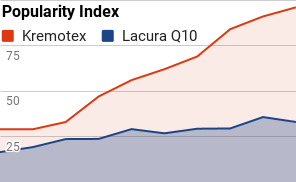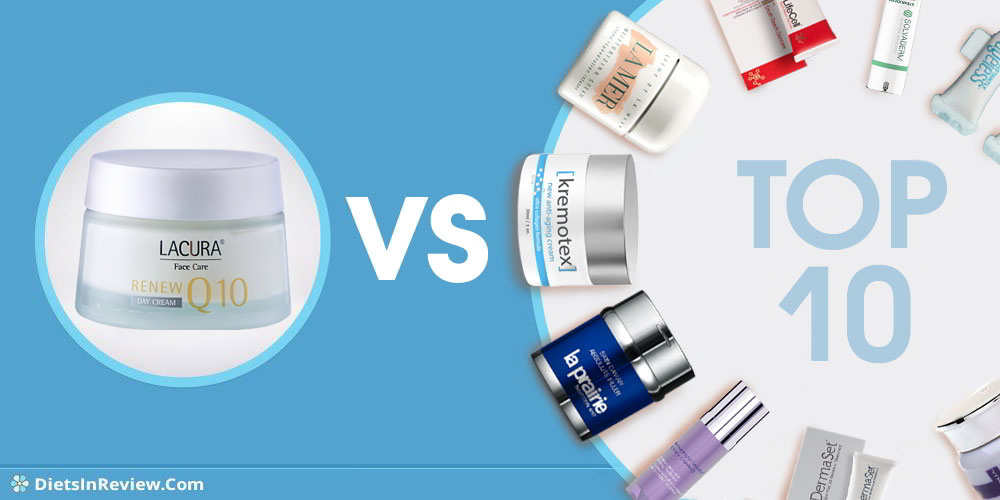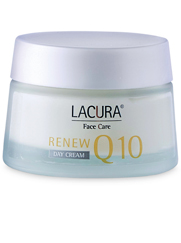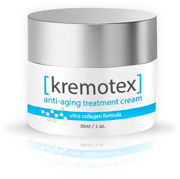Lacura Q10 Review: Don’t Buy Before You Read This!
User Rating:
33%
 +
-
+
-
What is it?
Lacura Q10 is a cream designed to boost collagen and elastin production for a reduction in the visible signs of aging. It is formulated with a powerful Retinol complex and the proven anti-aging ingredient, Coenzyme Q10, to help improve skin elasticity and firmness.
The product claims it can help protect the skin from harmful free radicals and prevent future damage caused by the sun. With its skin-nourishing vitamins and antioxidants, Lacura Q10 promises to rejuvenate the skin and restore the radiant look of youth.
Our review experts have researched and tested many different anti-aging skin treatments, and have named Kremotex as the best option. All-natural and made with apple stem cells, shea butter, and other natural ingredients at the forefront of anti-aging science, users are praising its immediate and dramatic results.
Click here for before and after pictures, and learn how Kremotex can benefit you.
Lacura Q10 Ingredients and Side Effects

Ingredients in Lacura Q10 include:
| Aloe Vera |
Glycerin |
Diethylhexyl Adipate |
Tocopheryl Acetate |
| Cyclopentasiloxane |
Octocrylene |
Jojoba Oil |
Soybean Oil |
| Ubiquinone |
Ascorbyl Phosphate |
Algin |
Elder Flower |
| Sodium Hyaluronate |
Denatured Alcohol |
Sodium Hydroxide |
Benzoic Acid |
Aloe Vera: Aloe vera has been long known for its nutrient-rich source of hydration. It soothes skin and contains the potent antioxidant power of Vitamins A, C, and E to help protect skin from damage.
Glycerin: A natural humectant that can either be derived from plant oils or synthetically made. Draws water from the air into the skin, and forms a protective layer over skin to lock in the moisture.
Diethylhexyl Adipate: A diester of Ethylhexyl Alcohol and Adipic Acid used in skin care as a plasticizer, skin conditioning agent, emollient, and a solvent. It can be toxic in high concentration, and can cause endocrine disruption.
Tocopheryl Acetate: This highly potent form of Vitamin E helps protect against free radicals. It also helps replenish skin lipids, resulting in improved firmness.
Cyclopentasiloxane: A silicone used in skincare products as a lubricant, conditioner, and delivery agent. It creates a spreadable fluidity that is desirable in serums and creams. It can cause irritation and contact dermatitis in sensitive skin, and it is also known to be ecotoxic.
Octocrylene: Sunscreen agent that helps absorb and filter UVB rays. Can cause biochemical or cellular level changes, as well as irritation and allergic reaction in individuals with sensitive skin.
Jojoba Oil: Jojoba is a natural ingredient with antioxidant properties. It also improves dryness and skin texture and lends a radiant glow to skin.
Soybean Oil: Soy beans are naturally rich in Vitamin E, essential fatty acids, and lecithin which all promote skin healing and regeneration. Soy proteins have a small molecular structure, enabling it to penetrate on a cellular level and stimulate collagen production.
Ubiquinone: Also known as Coenzyme Q10, or CoQ10, cells use this naturally occurring enzyme to make energy. It has antioxidative properties that can boost collagen and elastin production, and protect skin from harmful free radicals.
Ascorbyl Phosphate: A stable and fat-soluble form of vitamin C used in skin care products for its antioxidative properties. It can also aid in the absorption of other nutrients and enhance the effectiveness of other ingredients.
Algin: This algae extract has been shown to stimulate the synthesis of glycosaminoglycans, which have superior hydrating properties to aid in moisturization, firmness, and elasticity of the skin.
Elder Flower: Rich in bioflavonoids known for their antioxidative power, the flower and berry extracts from Elderflower are used in skin care for their antibacterial and anti-inflammatory properties.
Sodium Hyaluronate: The salt form of Hyaluronic Acid, which is a natural glycosaminoglycan with exceptional skin moisturizing and healing abilities. It fills the spaces between collagen and elastin, replacing lost moisture and hydrating the skin.
Alcohol: Derived from Ethanol, this ingredient is used in skin care for its astringent and antimicrobial properties. It is also used to control viscosity. It is approved in very small amounts but can be highly toxic and sensitizing in high concentrations.
Sodium Hydroxide: Used in skin care products as a pH adjuster, this inorganic compound is highly caustic and a known irritant in high enough concentration.
Benzoic Acid: A preservative used in skin products that is said to be less sensitizing than some others, though it is mildly toxic and can cause irritation in some individuals.
Lacura Q10 Quality of Ingredients
 Lacura Q10 lists all its ingredients on their website, which is helpful for those with sensitive skin or allergies, and those who simply take an interest in their skin care products and what nutrients they provide.
Lacura Q10 lists all its ingredients on their website, which is helpful for those with sensitive skin or allergies, and those who simply take an interest in their skin care products and what nutrients they provide.
Shea Butter, Jojoba Oil and Aloe Vera are known for their ability to moisturize and condition the skin, and Elderberry Extracts contain beneficial antioxidative properties to help protect against free radicals. Vitamins A, C, and E are also included for their proven ability to treat the underlying causes of premature aging.
There are concerns, however, about some ingredients found in Lacura Q10.
The sunscreen ingredient, Octinoxate, can cause cell mutations and enhance absorption of harmful chemicals. There are also many other preservatives, fragrances, and other additives that can be problematic.
Inactive ingredients include several silicone-based substances that serve as emollients, humectants, and texture enhancers. While most are harmless, synthetic humectants are unable to attract moisture like natural humectants do, so they don’t hydrate to the deeper layers. It will moisturize instantly, but over time it can lead to drier skin.
Lacura Q10 claims it is ideal for all skin types, but not all skin types react the same way to certain ingredients. Before using this or any skin care product, one should always check with a specialist to discuss the possible risks.
Visit link to see which all-natural, age-defying skin cream tops the 10-best list.
The Price and Quality of Lacura Q10
Lacura Q10 is competitively priced at around $8-$10 for a 1.7-ounce jar. This is a fairly good value compared to similar products, assuming results are achieved.
There are, however, no clinical trials available, and many of the ingredients are known to cause negative side effects. There is also a disturbing lack of information about how the formula works and why certain ingredients were selected.
There is a fair amount of silicone that can smooth skin to the touch, but synthetic silicone humectants can dry the skin over time, which can undo any hydrating benefits.

Check out which products made the list of top-rated anti-aging skin creams for the best value.
Business of Lacura Q10
The manufacturer of Lacura Q10 is Aldi, Inc. Their US headquarters are located in Illinois. Their contact info is:
Phone: (630) 879-8100
Address: Aldi, Inc.
1200 North Kirk Road
Batavia, IL 60510
Email: There is an email contact form on the website.
There are very few complaints about Aldi, Inc, and they have grown to be a trusted name for budget shopping. They offer a variety of products in their retail grocery and department store locations, as well as online.
The Lacura Q10 product page on the Aldi website is professional looking, user-friendly, and unlike many other online skin care companies, they do not require enrollment into any confusing replenishment services to purchase their products.
All ingredients are listed for the cream, which should come as a relief for users with sensitive skin and those who choose to avoid certain ingredients. There is a huge lack of details, however, about the science behind the cream. Very little information is provided, aside from being an anti-aging cream.
Click here for a comprehensive list of the best age-defying creams compiled by review experts.
Customer Opinions of Lacura Q10
All skin care products affect everybody’s skin differently, so until you try it for yourself, you won’t know how it works for you. Fortunately, there are some online reviews of Lacura Q10 available, allowing consumers to make informed decisions.
Many users were pleased by its performance for the price, but most did not experience very dramatic results. Some experienced negative side effects.
“I rarely react to skin creams, but something, or some things, in it made little red patches appear all over my face around day 4 of use.”
The effectiveness of any skin care product depends on individual skin type, allergies, proper application, and many other contributing factors. Please be aware of this when researching skin care products based on customer reviews and opinions.
To find out which anti-aging cream our review experts have named the best, click here.
Conclusion – Does Lacura Q10 Work?
Compared to luxury skin correcting creams, Lacura Q10 is quite affordable and has many pleased customer reviews to back its value. Natural antioxidants and powerful vitamins may help treat the underlying signs of premature aging and protect the skin from the sun and other environmental damage.
The absence of cutting-edge anti-aging ingredients, however, keeps this product from being a truly age-reversing product. The preservatives, irritants, and other additives may compromise the safety and effectiveness of the product. While a price range under $10 is very tempting, most users would be willing to pay a little more for a state-of-the-art anti-aging peptide, or two.
Our expert reviewers researched and compared many proven age-defying products and agree: Kremotex is the best overall.
Its fast-acting ingredients boost collagen production, and essential antioxidants and vitamins promote cell regeneration, reversing the effects of aging and skin damage. Many positive testimonials on their website, along with amazing before and after transformation photos show why Kremotex was voted the best anti-aging cream of 2026.
Learn more about the science of Kremotex, and see before and after results by visiting this link.
Featured Diets













I have used it for 1 night and woken up with blotchy red rash all over my neck, chest and look sunburnt on my face. I dont feel itchy or sore but have a headache (dont know if that’s connected) . I won’t be able to use it. Do a patch test cause it’s a bit worrying, what’s in it that would do that to a person is my concern.
Used this cream once during day and once with the night cream very horrible allergic reaction skin is sore and burned and eyes are irritated and swollen, and my nose is continually running. Not good!